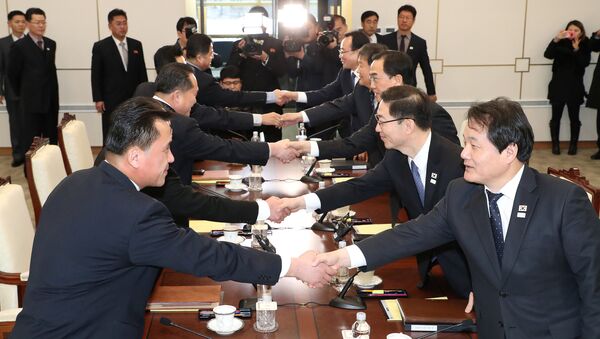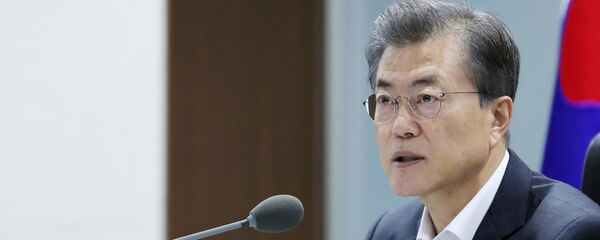The meeting of the high-level delegations from Pyongyang and Seoul, which took place on Tuesday in a demilitarized zone between the two countries, helped resolve some of the issues requiring immediate attention, such as the participation of North Korean athletes in the Olympic Games in South Korea.
Pyongyang and Seoul agreed to rebuild a full-scale dialogue on various issues, including military ones. Namely, they decided to restore talks between military personnel in order to prevent incidents involving weapons. The two sides also vowed to ramp up exchanges and collaboration in various fields.
Urgent Issues Solved
Ba Dianjun, an expert with the Northeast Asian Studies College at Jilin University, told Sputnik that the two sides were able to reach their chief goals, although they did not touch upon larger problems.
"As a result, both sides reached their main aims: the participation of North Korea in the Winter Olympics in South Korea's Pyeongchang, the detente in the long-term tensions on the Korean Peninsula. At the same time, the sides did not dare touch upon North Korea's nuclear program and other, deeper, problems," Ba said.
Jin Xiangdong, an analyst with Xiamen University's international relations college, agreed that the talks reached the expected results, but the full eradication of tensions on the peninsula would depend not only on Seoul and Pyongyang, but on Washington as well.
Washington's Wishes
None of the parties to the current conflict wants to start a war, but, at the same time, the United States is not interested in fully getting rid of tensions on the Korean Peninsula, according to the expert from Xiamen University.
"None of the sides wants to start a war, including the United States. However, the peace on the Korean Peninsula is not on Washington's agenda, since, in that case, the United States would lose the pretext for consolidation of their allies, South Korea and Japan, against China, there would be no justification for US presence in South Korea," Jin told Sputnik.
The expert added that the United States would lose a huge weapons market if the crisis on the Korean peninsula was resolved.
In September last year, shortly after Pyongyang's sixth nuclear test, Trump said he would allow South Korea and Japan to buy an increased amount of "highly sophisticated" military equipment from the United States.
READ MORE: Trump to Moon: US is Open to Talks With N Korea Under 'Right Circumstances'
Washington and Pyongyang's remarks became increasingly heated throughout the summer and fall of 2017, with the United States emphasizing its military prowess. South Korean President Moon Jae-in has been advocating talks with North Korea, but, according to the Xiamen University expert, the intra-Korean negotiations may not be able to provide a definitive solution for the problem.
"The intra-Korean talks may turn the situation around, when it heats up, but how far the situation may go in either direction depends on the United States," Jin told Sputnik.
Meanwhile, Jilin University's analyst urged "cautions optimism" regarding the potential success of further intra-Korean negotiations.
The views and opinions expressed by Ba Dianjun, Jin Xiangdong are those of the speakers and do not necessarily reflect those of Sputnik.




